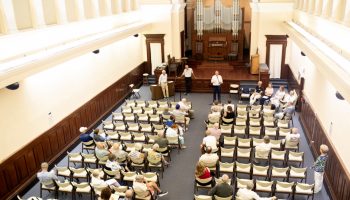

Cody Englander & Julia Weber
Staff Writers
In a public webinar Monday, Interim Chief Executive Kyle Keogh announced that Chautauqua Institution will face significant budget cuts in the months ahead.
“I think we’re in a really good spot this summer,” Keogh said. “We’ll find out soon enough if it’s a respite or a reset, but there’s a real joy to this place.”
Keogh was appointed to the interim position following the departure of former president Michael E. Hill and took on the role at the beginning of June. Keogh is a longtime Chautauquan who previously served as a trustee on the Institution’s board from 2015 to 2023.
Since Hill’s departure, the Institution has hired advisory firm Heidrick & Struggles to assist with the search for its next president.
During the webinar, Keogh explained the financial state of the Institution and its approximate annual $50 million budget. He said he hopes to reduce the expenses of the Institution by $4 to $6 million. According to Keogh, the current budget was based on pre-COVID-19 growth projections, which have not been met.
The main net income for Chautauqua Institution is parking and gate passes, amassing a total of over $16.4 million dollars annually. In addition, $6.2 million of the income comes from endowments and the annual Chautauqua Fund.
In January 2024, Boundless, a Campaign for Chautauqua, was announced with the goal of raising $150 million for Chautauqua Institution through 2026 in alignment with the Institution’s recent sesquicentennial. On June 20, the Institution announced that Boundless had met and exceeded that goal, a year ahead of schedule.
While the Institution’s endowment is tremendously healthy, Keogh explained that the Boundless campaign differs from the day-to-day operating budget in that the philanthropic campaign focuses on capital expenditures and grounds improvements, such as the Roe Green Theater Center and the Greene Family Commons.
“Those are amazing things that are going to help Chautauqua going forward, but they do not help our operating budget,” Keogh said. “This is around the operating budget — the operating budget being the amount of revenue we bring in every year, less the expenses that we incur.”
To begin the webinar, Keogh walked through Chautauqua’s Net Promoter Score, a way to assess Chautauquans’ satisfaction with customer service and their likelihood of recommending this place to others. The score ranges from zero to 100. According to Keogh, 50 is excellent and 80 is world class. Chautauqua received a 64 for customer service and 73 for likely to refer.
He then discussed the proposed budget cuts the Institution plans to implement following the 2025 Summer Assembly Season. Chief among the proposed budget cuts are three areas: year-round personnel, operating costs and programming.
Keogh said the Institution is looking at ways to remove $2.5 million to $3 million from year-round personnel. He said the former financial projections anticipated growth that has not since come, and as a result, the Institution needs to ensure the cost structure and year-round employee base matches that.
“We built ourselves for growth. That growth has not come,” he said. “And now we need to make sure our cost structure and, in particular, our main year-round employee base matches that.”
The changes to the budget will be the result of staff retirements, unfilled positions, staff reductions and area reorganizations with the goal of significantly reducing the budgetary stress in this area of the Institution’s finances. Keogh specifically highlighted prospective reorganizations like integrating Youth and Family Programs with Recreation Services, and integrating accommodations services into the Ticketing Office.
“We are going to try and identify and mitigate risks here,” Keogh said, “and we’re looking at any philanthropic opportunities.”
In addition to the Institution’s budgetary cuts to year-round personnel, the Institution plans to cut $1 to $1.5 million from its current operating costs. Some of the proposed changes include closing Chautauqua Institution’s Washington D.C. office — a decision Keogh announced less than a week into his tenure — eliminating the Grounds Access Pass, reducing staff housing expenses, rethinking or eliminating enterprise initiatives and breaking even in other certain areas.
The Grounds Access Pass, which offers an opportunity to access the grounds without accessing the Amphitheater performances, originated as a method of bringing people to Chautauqua during the pandemic. Now, five years later, the Institution seeks to eliminate it.
Keogh said a major operational cost to the Institution is the price increase for employee housing on the grounds. Since 2019, on-grounds employee housing has seen a roughly 80% increase. According to Keogh, the nightly price of housing rose from $107 in 2019 to more than $193 in 2025.
The 2025 cost for housing on-grounds employees is nearly $900,000 for 101 staff bedrooms.
Keogh also said the Institution spends $5.3 million to maintain the grounds. This cost is partially offset by property owners’ service charges, a transaction fee during property purchases combined with some philanthropy, but the Institution is still operating at a deficit of over $3 million in its maintenance of the grounds.
“It’s a beautiful spot, and this is just the maintenance. This is not the capital improvements,” Keogh said.
Keogh shared a portfolio management analysis of areas operating at a loss that are facing budget reductions in order to break even. First was CHQ Assembly, the online platform created during the COVID-19 pandemic.
“We spend about $243,000 more on CHQ Assembly than we make in revenue,” he said. “… It’s a fairly expensive proposition to put on at high quality, so we need to think about how we can get that to a zero subsidy.”
Keogh also pointed to The Chautauquan Daily as another area facing budget cuts, citing increased stipends for interns and “the cost of circulation and the cost of printing” the newspaper that have “gone up dramatically.” He said the Institution is losing $170,000 a year at the Daily, which was founded in 1876 and celebrates its sesquicentennial in 2026.
“It’s the moment we have to look at and say, how important is this? As we’re making tradeoffs,” he said, “do we want to invest $170,000 each year into The Chautauquan Daily? … If you go anywhere else in the world, there’s not that many papers, so we really need to evaluate this.”
Keogh also pointed to operational enterprises, using the Athenaeum Hotel and the Chautauqua Bookstore as examples. He explained that the Institution makes $5.2 million from earned revenue enterprises through these endeavors, but expenses are $4.8 million. He said, not looking at any allocations, they net approximately $350,000 from this area.
Moving forward, Keogh said the Institution intends to reduce costs in a number of areas and further invest in others. His priorities include preserving the Chautauqua experience, allocating $4.2 million in annual capital preservation and maintaining an “adequate cash balance” for the Institution.
General administrative costs, including Keogh’s position, currently operate at a nearly $7.9 million dollar deficit, which include finance, auditing, marketing and other essential roles at the Institution.
The last area of major budget cuts is programming, which faces roughly $1 million in cuts. The plans for programming are to reduce investments in targeted areas and to solicit endowments and annual philanthropy support.
Keogh proposed increased philanthropic pursuits and financial gifts as a way to maintain the longevity of Chautauqua’s programming without as significant of a financial burden on the Institution, but he said the Institution is not currently relying on endowments as their current plan to support programming.
“What we’d love to do is a shift from endowing buildings or endowing other areas to really thinking about endowing programming,” Keogh said. “If the orchestra is what you value, can you support it? We’d like you to consider doing this in addition to what you’re already doing, but we understand everybody has to make their own decisions.”
“We’d love for you to consider what your financial resources are and your love for this place, and to really lean in at this moment — as many others have done — and say ‘What can I do to really help Chautauqua?’ and to actually give until it feels good. Until it feels like what you’re doing and how much you’re donating to us matches that,” he said.
He also stated he would “be open to eliminating some programming.”
Keogh said the Institution is open to bringing the art schools to the Amp more frequently to reduce costs of programming, and is looking at supplemental revenue streams within the gates, such as selling alcohol at the Amp to increase profits.
“We are going to sell alcohol that you can take into the Amphitheater,” Keogh said. He likened the idea to alcoholic sippy cups at Broadway shows.
Keogh also stressed the importance of expanding Chautauqua’s audience to include more diverse demographics.
“We have to get to be more racially diverse, and that includes racially diverse and younger in this place,” said Keogh. “That is an important part of the plan going forward.”
Moving forward, the Institution is soliciting community feedback.
To gain insight on important touchstones for Chautauquans, a 2024 survey was distributed to long-term gate pass purchasers with valid email addresses to understand the most important parts of Chautauqua’s programming and traits for the community.
The three leading results were: the Chautauqua Lecture Series (22%), the Chautauqua Symphony Orchestra performances (15%) and a sense of community (13.9%).
Keogh said, as a not-for-profit, the Institution does not aim to make money but to create a valuable experience for visitors.
He said steps have been taken to solicit Chautauquans’ feedback about the budget cuts.
“Four to six million dollars is a big problem,” Keogh said. “We would like your help. When you write it down and you share it with people, they can then give you better ideas on how they can improve, and now we want your help. We’re going to change up Forum Dialogues for Weeks Seven, Eight, Nine to be focused on this topic.”
Chautauquans can email Keogh with suggestions, feedback or comments at kkeogh@chq.org.




